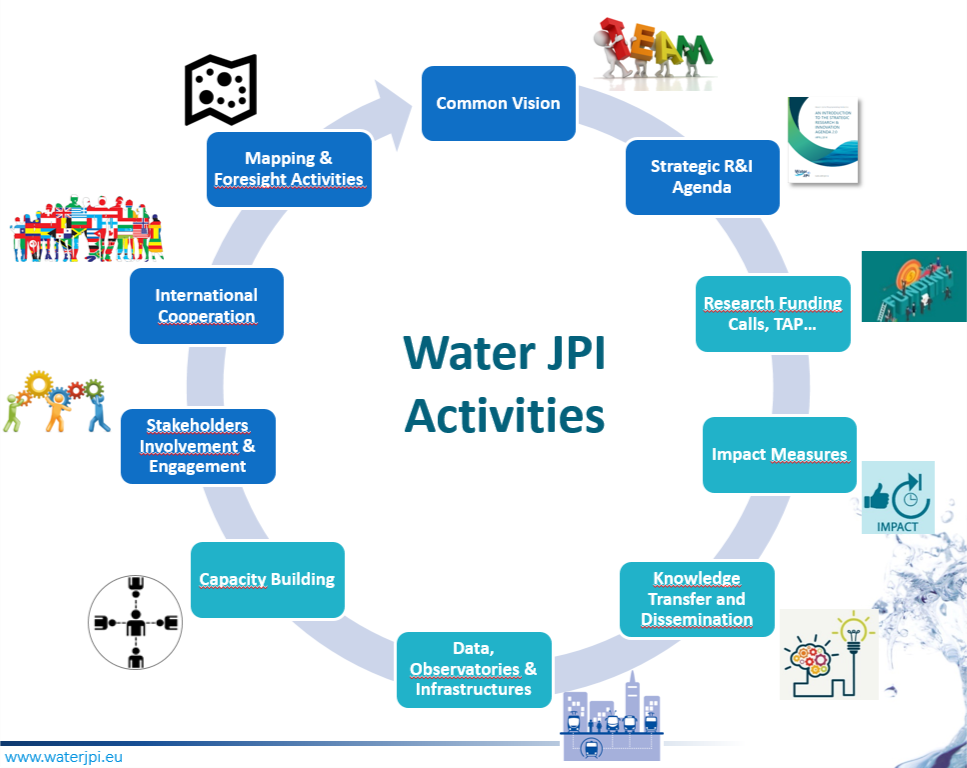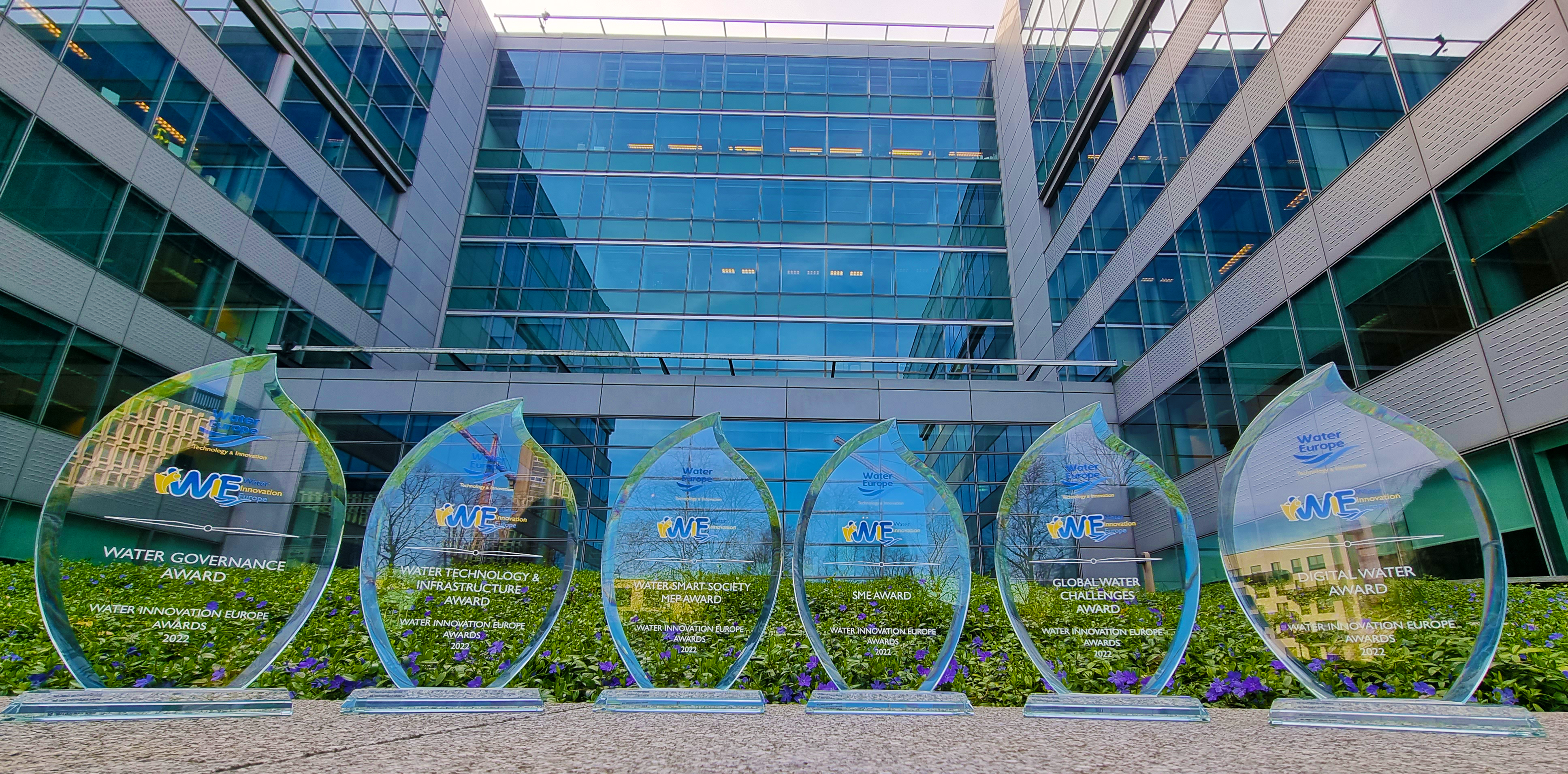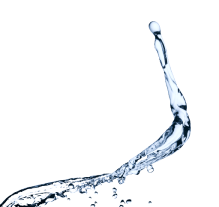What is the Water JPI about? What is it working on?
The Joint Programming Initiatives (JPIs) are intergovernmental initiatives and tackle societal challenges that cannot be addressed by single countries alone. JPIs foster cross-border collaboration and coordination of research and innovation programmes to effort major, common European and international societal challenges in a structured way, and deliver significant results.
In December 2011, the Water JPI “Water Challenges for a Changing World” was launched to convene the challenge of “achieving sustainable water systems for a sustainable economy in Europe and abroad”. Started around a core of European countries, it is now becoming global, with 23 full members, three observers and six associated partners from the EU, neighbouring countries (Israel, Moldova, Norway and Turkey) and the world (Brazil, Canada, Egypt, Taiwan and Tunisia).
The members are acting on the following key principles:
- Joint actions (figure below) are launched based on a shared SRIA (Strategic Research and Innovation Agenda) agreed by all actors.
- Variable geometry: countries participate only in activities related to their specific interests.
- Flexibility: activities are developed in response to partners’ needs and opportunities using a large range of implementation tools.
- Everything in common except funding: each JPI partner funds its activities and its communities’ participation (so-called virtual common pot).

The Water JPI produces science-based knowledge supporting European and International policies, comprising the identification of problems, their quantification, and the development of feasible technical and managerial solutions. For that, the JPI mobilises existing national and regional RDI programmes and aims to harmonise their research agendas and infrastructures. It will define common research needs and develop joint activities that will increase efficiency by avoiding duplications across Europe and beyond. The Water JPI provides an opportunity for broader cross-border cooperation, greater collaboration and a more unified focus on water RDI across Europe and beyond.
Could you please tell us a few words about the future water partnership and what it is all about?
The European Union is currently developing Horizon Europe, an ambitious €100 billion research and innovation programme to succeed Horizon 2020. One of its pillars, the Framework Programme, plans to support European partnerships with EU countries, the private sector, foundations and other stakeholders. The aim is to deliver on global challenges and industrial modernisation through concerted research and innovation efforts.
One proposal, called Water4All – Water Security for the Planet, aims at enabling water security for all in the long term. This will be achieved through boosting systemic transformations and changes across the entire water-research innovation pipeline, fostering the matchmaking between problem owners and solution providers. It proposes a portfolio of multi-national, multi-faceted and cross-sectoral approach, encompassing policy, environmental, economic, technological and societal considerations. Enabling water security for all is a keystone for achieving the Green Deal and a Healthy Europe.
It is jointly proposed by the European Water platforms (Water JPI, Water Europe, EUREAU, Aqua Publica Europea, EURAQUA, European Water Alliance) and was elaborated during a series of meetings, some opened to different communities (policy-makers, Member States (MS) representatives, research communities, water utilities, ….).
Could you please tell us about the importance of collaboration between Water JPI and Water Europe?
One of the barriers identified for a more efficient implementation of the Water-related Policies, for a smart transition to a circular economy and for ensuring water security for all end-users, is to connect “downstream” funding programmes (development of new knowledge, identification of future challenges, providing equipment investments, etc.) to demonstration programmes on the efficiency and fairness of new innovations at the field scale, and transform pilots into operations. Several elements of the system have to change simultaneously and therefore the actors involved in the research-innovation pipeline have to cooperate closely to make it successful.
Water Europe with its different colleges (Water utilities, Multinational corporations and SMEs, Research & Technology developers, technology and services suppliers, water users or NGOs) is one of the key partners of the Water JPI and its national & regional public research funders, for:
Facilitating the identification of the end-users’ needs
Developing an action plan with these sectors for co-creation and co-development of appropriate tools and concrete actions; and
Then transferring innovative solutions easily transposable in all countries in demand.
We see a number of important benefits, motivations and enabling factors for this cooperation. This includes a greater impact of R&D results and of scientific discovery and advances in technology; scale, scope and complexity of research topics and international issues; or capacity-building development.



